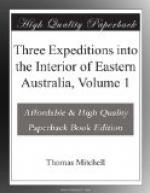Looking as if they understood me, they hastened to resume their work, and I discovered that they dug up the roots for the sake of drinking the sap. It appeared that they first cut these roots into billets, and then stripped off the bark or rind, which they sometimes chew, after which, holding up the billet and applying one end to the mouth, they let the juice drop into it. We now understood for what purpose the short clubs which we had seen the day before had been cut. The youths resumed their work the moment they had received the tomahawk without looking more at us or at the tool. I thought this nonchalance rather singular, and attributed their assiduity either to a desire to obtain for us some of the juice, which would have been creditable to their feelings; or to the necessity for serving some more powerful native who had set them to that work. One had gone, apparently to call the tribe, so I continued my journey without further delay. We soon regained our track of the first day, and I followed it with some impatience back to the camp.
HORSES REACH THE CAMP WITH GREAT DIFFICULTY.
My horse had been ill on the second day, and as this was the third on which it, as well as the others, had gone without water, they were so weak that, had we been retarded by any accident another night in the bush, we must have lost them all. They could be driven on only with difficulty, nevertheless we reached the camp before sunset.
PART OF MR. CUNNINGHAM’S COAT FOUND.
The tidings brought by the men sent after Mr. Cunningham’s footsteps were still most unsatisfactory. They had followed the river bed back for the first twelve miles from our camp without finding in it a single pond. They had traced the continuation of his track to where it disappeared near some recent fires where many natives had been encamped. Near one of these fires they found a portion of the skirt or selvage of Mr. Cunningham’s coat; numerous small fragments of his map of the colony; and, in the hollow of a tree, some yellow printed paper in which he used to carry the map. The men examined the ground for half a mile all around without finding more of his footsteps, or any traces of him besides those mentioned. It was possible and indeed, as I then thought, probable, that having been deprived by the natives of his coat, he might have escaped from them by going northward towards some of the various cattle stations on the Macquarie. I learnt that when the men returned with these vestiges of poor Cunningham, there was great alarm amongst the natives, and movements by night, when the greater part of the tribe decamped, and amongst them the fellow with the handkerchief who never again appeared. The chief, or king (as our people called him) continued with us, and seemed quite unconscious of anything wrong. This tribe seemed too far from the place where the native camp had been to be suspected of any participation




